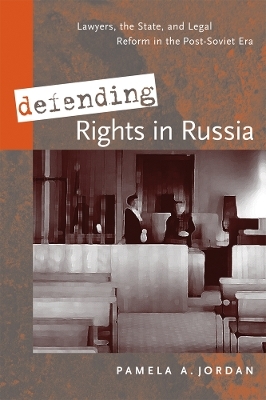
Defending Rights in Russia
Lawyers, the State, and Legal Reform in the Post-Soviet Era
Seiten
2005
University of British Columbia Press (Verlag)
978-0-7748-1162-0 (ISBN)
University of British Columbia Press (Verlag)
978-0-7748-1162-0 (ISBN)
- Titel z.Zt. nicht lieferbar
- Versandkostenfrei innerhalb Deutschlands
- Auch auf Rechnung
- Verfügbarkeit in der Filiale vor Ort prüfen
- Artikel merken
Offers a study of the Russian bar (advokatura) that provides a portrait of how, after the USSR's collapse, practising lawyers called advocates began to assume new, self-defined roles as contributors to legal reform and defenders of rights in Russia. It is useful for specialists on Russia, post-communism, human rights, and legal studies.
Lawyers often play pivotal roles in building democracies. PamelaJordan’s engaging study of the Russian bar (advokatura) providesa richly textured portrait of how, after the USSR’s collapse,practising lawyers called advocates began to assume new, self-definedroles as contributors to legal reform and defenders of rights inRussia.
Using the historical institutionalism approach as her analyticalframework and drawing from comparative literature on legal professions,Jordan argues that the post-Soviet advokatura as an institution gainedmore, although not complete, autonomy from the state as it struggled toredefine itself as a profession. Advocates formed new bar associationsand law offices and now have a broader range of ways to defendclients’ rights than they did during the Soviet era. Jordansuggests that advocates’ work is supporting the growth of civilsociety and the strengthening of human rights in Russia.
Jordan concludes that, in a measured way, advocates redistributedsocial and political power by means of their role as intermediaryactors between state and societal forces. However, she also warns thatsuch gains could be reversed if the Putin regime continues to flout dueprocess rights.
Lawyers often play pivotal roles in building democracies. PamelaJordan’s engaging study of the Russian bar (advokatura) providesa richly textured portrait of how, after the USSR’s collapse,practising lawyers called advocates began to assume new, self-definedroles as contributors to legal reform and defenders of rights inRussia.
Using the historical institutionalism approach as her analyticalframework and drawing from comparative literature on legal professions,Jordan argues that the post-Soviet advokatura as an institution gainedmore, although not complete, autonomy from the state as it struggled toredefine itself as a profession. Advocates formed new bar associationsand law offices and now have a broader range of ways to defendclients’ rights than they did during the Soviet era. Jordansuggests that advocates’ work is supporting the growth of civilsociety and the strengthening of human rights in Russia.
Jordan concludes that, in a measured way, advocates redistributedsocial and political power by means of their role as intermediaryactors between state and societal forces. However, she also warns thatsuch gains could be reversed if the Putin regime continues to flout dueprocess rights.
Pamela A. Jordan is an assistant professor in theDepartment of History at the University of Saskatchewan.
Acknowledgments
Abbreviations
Introduction
1. The Russian and Soviet Bars: A Historical Perspective,1864-1984
2. The Advokatura in the Gorbachev Period, 1985-91
3. Chaos in the Advokatura, 1992-2002
4. Autonomy and Dependence: State-Bar Relations in the 1990s
5. Restructuring the Advokatura from Above, 2002-3
6. Russian Criminal Defence Advocacy in the Post-Soviet Era
7. New Trends in Advocates’ Practice in the Civil Sphere
Conclusion
Appendices
1 Surveys of Advocates’ Opinions /
2 Stages of a Russian Criminal Case /
Notes /
Selected Bibliography /
Index /
| Erscheint lt. Verlag | 18.5.2005 |
|---|---|
| Reihe/Serie | Law and Society |
| Zusatzinfo | 4 tables |
| Verlagsort | Vancouver |
| Sprache | englisch |
| Maße | 165 x 229 mm |
| Gewicht | 520 g |
| Themenwelt | Geschichte ► Teilgebiete der Geschichte ► Militärgeschichte |
| Recht / Steuern ► Allgemeines / Lexika | |
| Recht / Steuern ► EU / Internationales Recht | |
| Recht / Steuern ► Rechtsgeschichte | |
| ISBN-10 | 0-7748-1162-5 / 0774811625 |
| ISBN-13 | 978-0-7748-1162-0 / 9780774811620 |
| Zustand | Neuware |
| Haben Sie eine Frage zum Produkt? |
Mehr entdecken
aus dem Bereich
aus dem Bereich
neueste Manipulationstechniken als Waffengattung der NATO
Buch | Softcover (2023)
Westend (Verlag)
24,00 €


